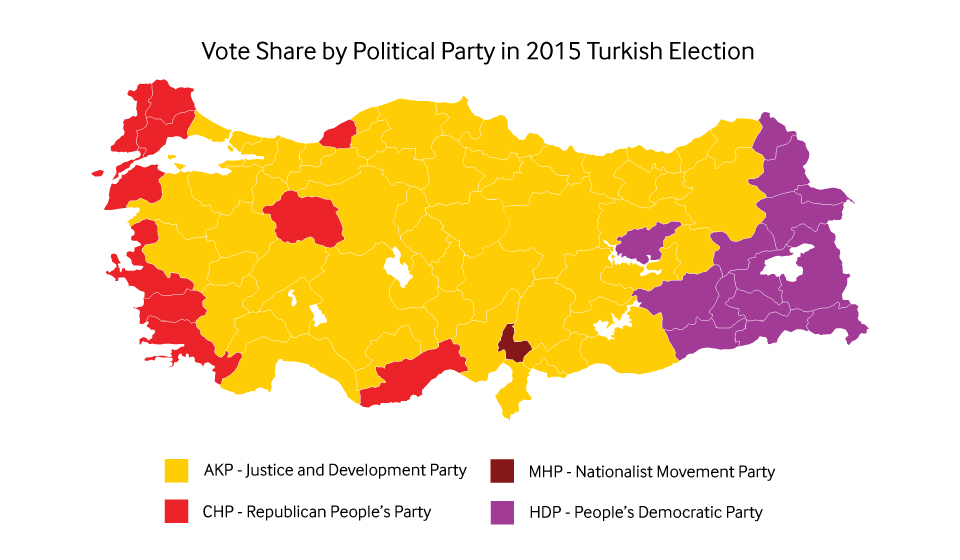The June 7 parliamentary election in Turkey changed the political situation in the country. The Justice and Development Party (Turkish: Adalet ve Kalkınma Partisi – AKP) failed to hold a sweeping victory its leaders had hoped for. The Republican People's Party (Turkish: Cumhuriyet Halk Partisi – CHP), the Nationalist Movement Party (Turkish: Milliyetçi Hareket Partisi, MHP) and pro-Kurdish Party got enough votes to form a coalition, though the contradictions between nationalists and Kurds make such an association hardly feasible.

Nevertheless, the Erdogan’s party got almost twice as many votes (41%) as the Republican People's Party led byKemal Kılıçdaroğlu. That is something to reckon with. It’s too early to say that the era of Erdogan is over. He is a master of political internal maneuvering and multi-phased foreign policy combinations. Turkish Prime Minister Ahmet Davutoglu has resigned in a procedural move after his party lost its majority in parliamentary elections. Many scenarios are considered and none of them should be written off. Accepting Mr. Davutoglu's resignation, President Erdogan expressed his thanks for the PM's services and asked him to continue to serve until a new government was established.
The Luxemburg-based ISA (International Strategic Analysis) is a world leader in the fields of country intelligence, economic forecasting and international market analysis. It is closely tied to US political establishment. According to it, Turkey is faced by a myriad of threats cross the border. The last thing the country needs today is a weak and split government, ISA says in a report.
Turkey is a key actor for regional security. The policy will hardly be subject to changes, as President Erdogan maintains a strong position in Turkish politics. The multi-dimensional foreign policy encompassing Russia meets the country’s national interests.
The Turkish Stream project will be an issue in spotlight. Gasprom held a – Gas Export and Enhancing Reliability of Gas Supply to Europe press-conference in Moscow on June 9. It was reported that there is no ground for any concern over the energy policy of Turkey after the election. Russian state-owned energy giant, Gazprom, announced that the intergovernmental agreement for the construction of the Turkish Stream Project, which will transfer Russian natural gas to Europe via Turkey, would be signed with Botas Petroleum Pipeline Corporation at the end of this month. Vice Chairman of the Board of Gazprom, Alexander Medvedev, said in a press conference, that the results of Turkish parliamentary election would not influence the implementation of the project
Turkey and Germany are the largest consumers of Russian gas. In 2014 Gasprom transported to Turkey 27, 3 billion of cubic meters of gas via Blue Stream and Trans Balkan pipelines. The same year Germany bought 40, 3 billion cubic meters of Russian gas to be followed by Italy (21, 7), Great Britain (15, 5) and France (7, 6).
Europe can take steps to join the Russian gas pipelines till 2019. «I want to emphasize again that after expiry of the transit contact with Ukraine, there will be no extension or conclusion of a new transit contact under any circumstances», Medvedev said. There will be only three routes by the time. The Nord Stream or the North European Gas Pipeline with only half of its capacity used due to the policy of discrimination adopted by European Commission. The second route is the pipeline going through Belarus and the third is the Turkish Stream project. According to experts’ estimates, Europe will need around 80-100 billion cubic meters of Russian gas in the near future. The Turkish Stream’s full capacity will be 47 billion cubic meters a year.

By insisting on compliance with the Third Energy Package Brussels made necessary the construction of pipelines to the would-be hub on the Turkey-Greece border. In case of South Stream Gasprom planned to shoulder the bulk of expenses. The European Union cut off its nose to spite its face insisting Gasprom could not transport the supplies. Now Europeans will have to spend money on pipelines construction taking it from national budgets, anti-crisis funds and other sources nearing depletion under the conditions of crisis. This is the time for the states of Central and South Eastern Europe to weigh in and take a stand. 70% of Russian gas supplies are destined for Poland, Hungary and Slovakia, the countries hardest hit by the rules established by Brussels. Bulgaria and Serbia also badly need gas stable gas supplies. Playing their geopolitical games they risk to be left with no gas at all.
This is what we have today. Turkish voters supported reforms inside the country, but there is a slim chance the country’s foreign policy would be drastically changed. European hotheads should not expect any cracks in Russia-Turkey partnership. They’d better mind their own business.
The situation is clear for those who got together in Elmau, Germany, recently. Even like-minded people in Central Europe admit the obvious facts. BRICS (Russia, China, India, South Africa and Brazil) become the political and economic center of the world with 56% of global production, around 70% of world currency reserves and 85% of population, says Czech Parlamentnilisty.cz. That’s what supporters of Euro-Atlantism in Serbia and other states of the region should take into account. G7 is turning into an ideological adversary of Russia and its allies in the emerging political East (BRICS). Obviously, no burning international issue could be solved without the participation of Russia and China.
G7 leaders deliver anti-Russian speeches, Obama calls for toughening sanctions against Russia and deploying missiles in Europe. It all creates a negative image of G7 and makes people hit the streets in protest.










